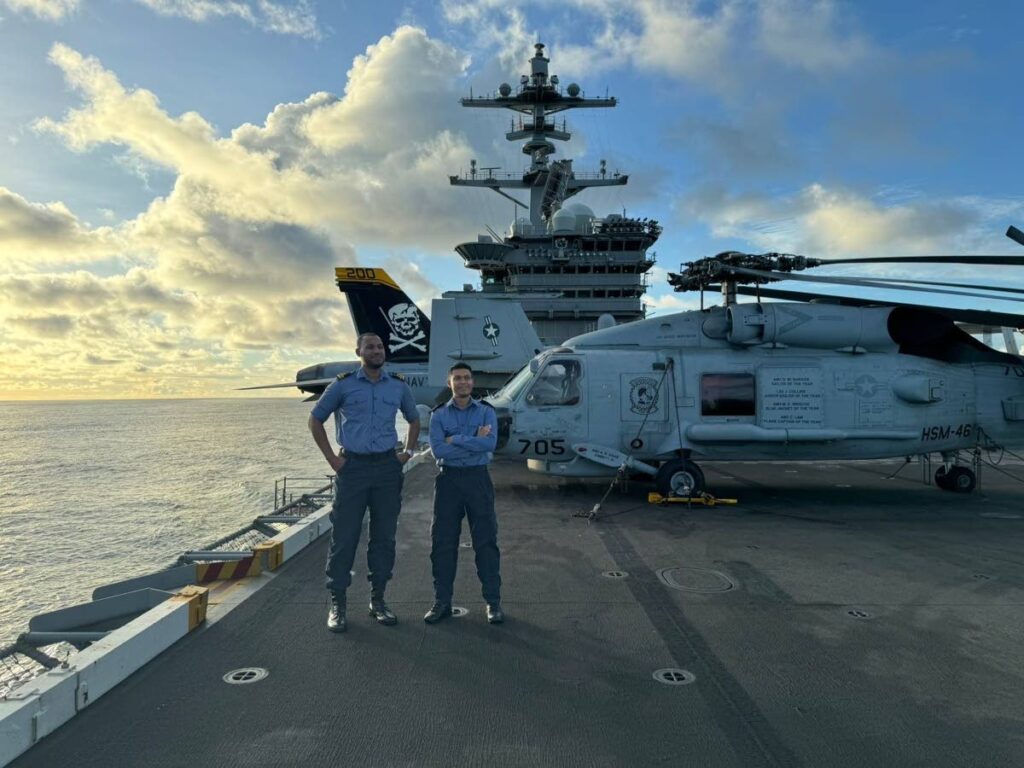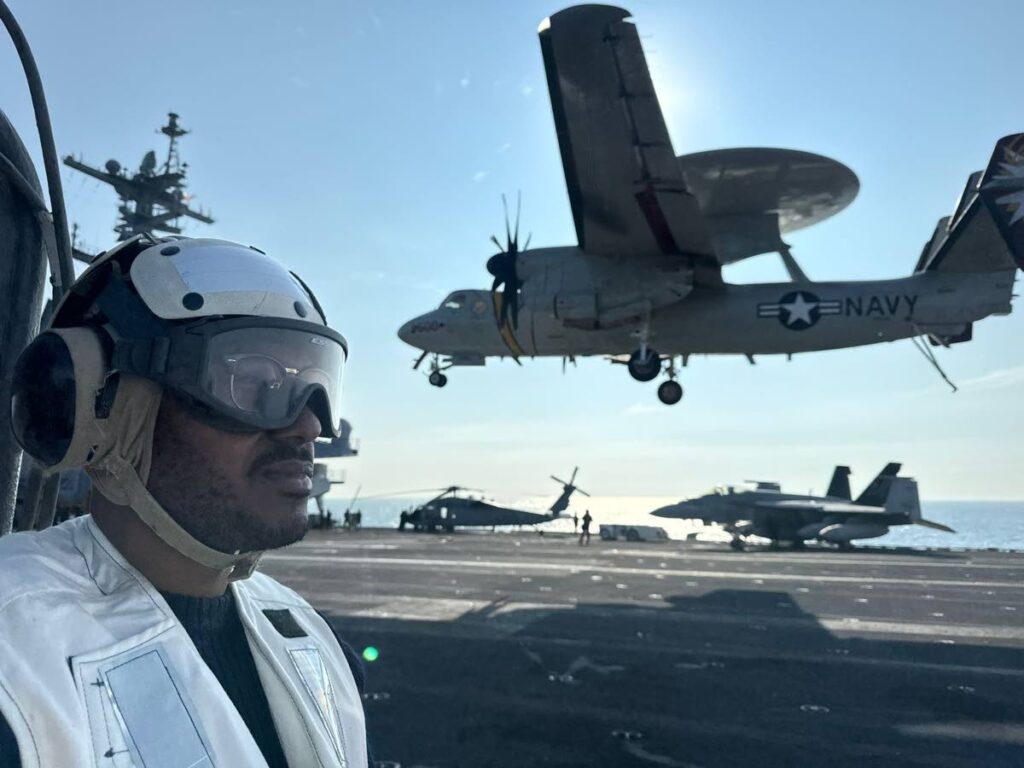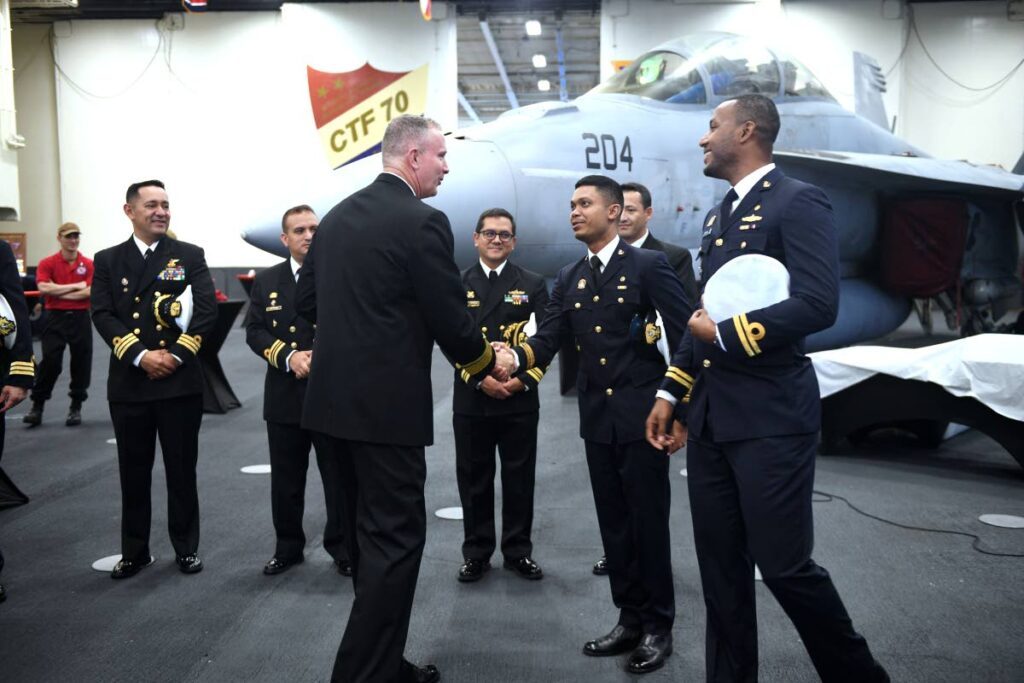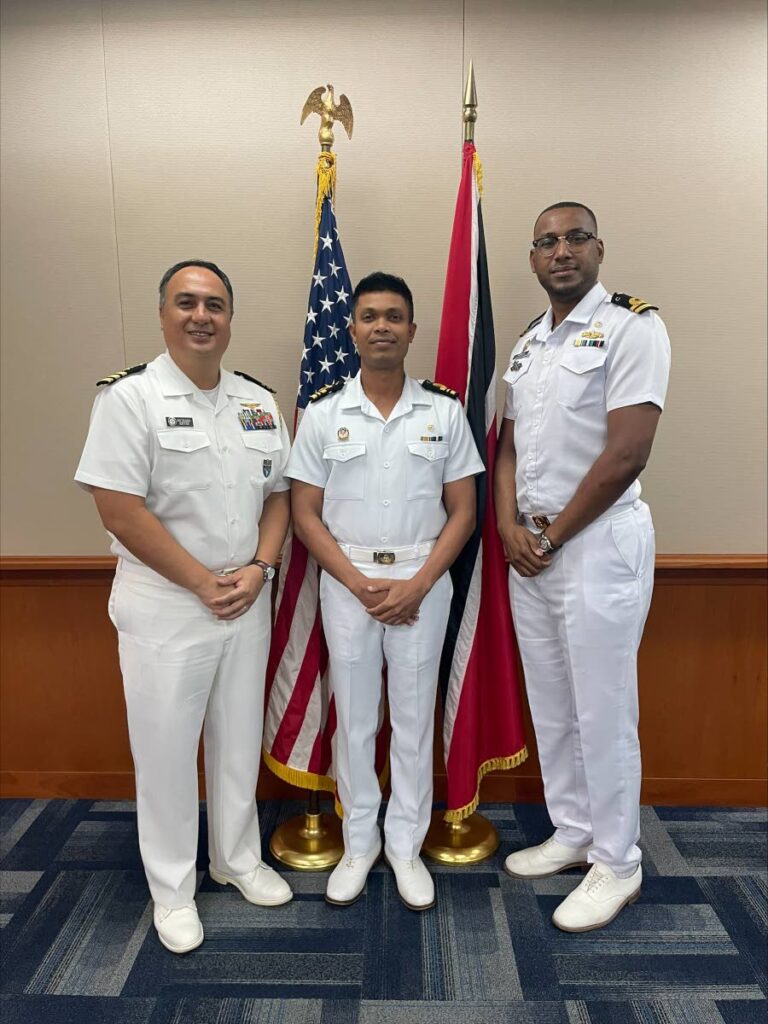Historic US mission for Trinidad and Tobago Coast Guard officers

AN aircraft carrier is something many people only see in movies, so to experience life on board the massive vessel is a once in a lifetime opportunity.
Lt Jadon Robinson and Lt Cdr Amit Ramlal, two members of the Trinidad and Tobago Coast Guard (TTCG), have become the first-ever serving members of the TTCG to be embedded on a US aircraft carrier.
The duo recently returned from an eight-week-long exercise aboard the USS George Washington as part of US Naval Forces Southern Command/US Fourth Fleet’s Southern Seas 2024 deployment.
Ramlal and Robinson were among two dozen officers from 11 partner nations, and the only Caribbean military personnel deployed as part of an international crew sailing to the US Southern Command area of operations.
Speaking with Newsday at the US consular offices on Sweet Briar Road, St Clair, Robinson described the experience as “wowing.”

The USS George Washington is one of the centrepieces of the US Navy’s fleet of warships.
The 34-year-old nuclear-powered vessel is 1,092 feet (333 metres) long, 257 feet (78 metres) wide and 244 feet (74 metres) high.
Known as a "super carrier," it has a top speed of more than 30 knots (56 km/h) and with its 4.5 acre flight deck, can accommodate approximately 90 aircraft.
A media release from the US embassy issued before the duo’s departure said Southern Seas 2024 was aimed at featuring subject-matter-expert exchanges and providing the opportunity for sailors from US partner nations to see aircraft carrier operations up close.
The duo also received training from US Naval War College professors and worked alongside US naval personnel to do detailed operational planning in support of operations at sea.
Robinson said they were left in awe on their first day.
“My first thoughts were, ‘This is huge’: just the grand scheme of this piece of machinery that you're seeing.
"And when we're driving into the port, we saw persons leaving the ship because we were told that they were given the opportunity to go ashore. And the vast amount of persons that we saw walking off of the ship was mind-blowing. With roughly 5,000 persons on board, it's a small city.
"The aircraft carrier is basically a floating airport.”
Once aboard, Ramlal and Robinson spent some time getting familiar with the vessel.
Robinson said contrary to belief, getting about the boat is easy, as it is “quite spacious,” but the size made it easy to get lost.
“We spent the first week getting lost over and over and over and trying to find our way around. Because there are so many different compartments and so many different alleyways, we just kept getting lost. You had many open decks, a lot of decks.”
They were given full tours of the ship to learn its operations.
“We had to do vessel familiarisation. We went through various compartments and departments on the ship to learn how the ship operates, how they do things, and where everything was.”
They even recalled meeting other Trinis aboard.

“So while we were walking around and we had our Trinidad patches and people would come up to us and say they're from Arima, or they're from Chaguanas. Then you're walking and you hear this accent and you're just following the accent because you’re thinking, ‘I know this accent.’ So there were quite a few Trinidadian Americans on the ship.”
Work began once they settled in,as the main purpose of the mission was exercises with several South American countries.
“We were doing joint operations with various South American countries, so as we passed each country, they would have sent out some of their ships and aircraft and they would have done different types of manoeuvres and operations.”
Robinson explained daily tasks included mission planning and intelligence-gathering.
“We assisted people in the planning phase. For example, when we were off Brazil’s coast, we assisted Brazilian officials in planning their operations, whether be it anti-aircraft missions, anti-submarine missions or surface warfare. Whatever the operation was, we assisted in planning it.
“We were given different areas of responsibility. Lt Cdr Ramlal worked in the operations department, while I worked in intelligence department. He was looking at current operations and what we are doing daily for next three days. I worked alongside a few other people to gather intelligence to feed into the day-to-day ops and gather any intel that may hamper future ops.”
They said one of the most amazing parts of the experience was witnessing the launch and landing of fighter jets on the boat’s deck. Planes landing on aircraft carriers have a hook attached at the back which must catch on a cable wired across the flight deck to bring them to a stop.
“It was an absolutely amazing experience just to observe the flight-deck operations.
"There was something that we were somewhat a part of called the landing safety officers. So they are the ones who actually guide the aircraft down to land.
"That's absolutely an amazing experience, because the planes come in at high speed and they have to catch the wire, and if not, they take off and go again and they're at almost full power.”
The flight deck can be one of the most dangerous places on the aircraft carrier and its operations are a thing of marvel for many.

Two sailors’ close encounter with a descending navy fighter jet on the USS George Washington in 2011 garnered 100,000 views in just 24 hours, and a video of the incident has since been used for safety training throughout the navy.
Despite the dangers, Ramlal said it is an experience he will cherish and hopefully live to tell his grandchildren about one day.
“Seeing the aircraft take off, just there are the catapults, steam catapults. And when they are doing all the checks, seeing all the flaps moving, seeing the flames from the planes’ exhaust –it's amazing.”
US Embassy senior defence official in the Military Liaison Office Cdr Richard Reyes said the Southern Seas operation is designed to strengthen interoperability and to work on collective combined security issues in the maritime domain.
Reyes said it was “awesome” to have Ramlal and Robinson participate in the exercise and suggested they represented Trinidad and Tobago well, as they have been invited to become the first TT representatives at another major maritime military exercise.
“(They) will also participate in the UNITAS exercise, which is being held in Chile this year. It’s an ongoing exercise that's been happening in this region since 1959. It is the longest-standing naval exercise in the world and believe it or not, this would be the first time TT participates.”
Unitas – which is Latin for "unity" – normally features in-port events such as symposiums, sports competitions, community relations projects, and cultural days. At sea, it can feature co-ordinated war-fighting events which lead up to a multi-day, multi-threat advanced scenario that allows the participants to work together as a multinational force.
Describing TT’s participation as historic, Reyes said he believes it is a good sign of US-TT co-operation in the future.
“It's going to help our interoperability and it's going to strengthen our partnerships.
"Navies and coast guards are unique in the defence forces because we're not landlocked and we meet each other in international waters and you never know when we're going to meet each other. So having that familiarity, when you get to be on a ship together with officers from other countries, you get to see how they operate, you get to build the relationships.”
Ramlal agreed with Reyes, saying building relationships was one of the most valuable takeaways of the experience.
“The personal relationships and friendships that you build, from what I've seen in my career, they help you bridge gaps. So the personal interaction is always really good.”
Ramlal and Robinson said they believe their participation will reap benefits for TT in the future as it afforded them exposure to military jargon and operations practices from various militaries.
“When we are operating together as a task force or a group, our interoperability and efficiency will have now increased, because if we are all going to be working together, we need to know how each one of us works,” said Ramlal.
Robinson compared the benefits of the operation to building a football team.
“We have different players coming together, but they have to train. They have to know how each person on that team plays to know how best to perform in a game.”
Ramlal added, “World challenges are complicated, whether it’s (fighting) transnational crime or responding to a natural disaster. Nowadays it takes a multinational approach, so it’s good having the personal relationships and the interoperability in terms of communication.”
Robinson said although the TTCG has a minuscule amount of resources compared to the US Navy, exposure to its practices and assets would not be wasted.
“Our assets are quite adequate for our type of operations. Looking at the US assets, it's quite understandable why they have such an enormous, fleet and seeing how they operate is quite similar to how we operate. Because if you drive a Nissan Note and you drive a bigger car, it's the same principles. So our operations are quite the same. It's just that they have a lot more systems and there's a lot more steps in it because it's a longer system. But it's quite similar to how we do things.”
Ramlal added, “TT may be small in size. Our coast guard may be small. We may not have a navy. But in terms of the way we do things, our procedures, it's very similar to most countries, if not all.”
Ramlal said apart from the daily duties and networking, the experience also had its fun elements.
“We did something called the crossing-the-line ceremony. It's an old naval tradition and it's a morale-boosting event filled with fun and a bit of mischief-making. It takes place when you pass the equator, because sailing through the equator is a tradition for the naval personnel, and it's not something everybody gets to do. You even get a certificate for it and have to carry it with you every time you are on a vessel that is sailing past the equator, else you have to go through the ceremony again.”
It’s for this reason Robinson, who described the military as a career, said many young people should consider the opportunity if it becomes available to them.
He said it is a great fit for people who are looking to develop themselves and give back to their country while growing in a career.
“The military is an excellent place. It offers so many different things, from personal growth to family life to academic development.
"It also allows you to see the world. I’ve been to over 30-something countries. So it gives you that ability to see things that you see on TV, things that you'd only hear about. There's so much things that the military can offer if younger generations give it a chance.
“Forget the grey noise, the things that you hear in the background. The negativity will always be out there, but there are a lot of positive things to be gained from the military.”

Comments
"Historic US mission for Trinidad and Tobago Coast Guard officers"